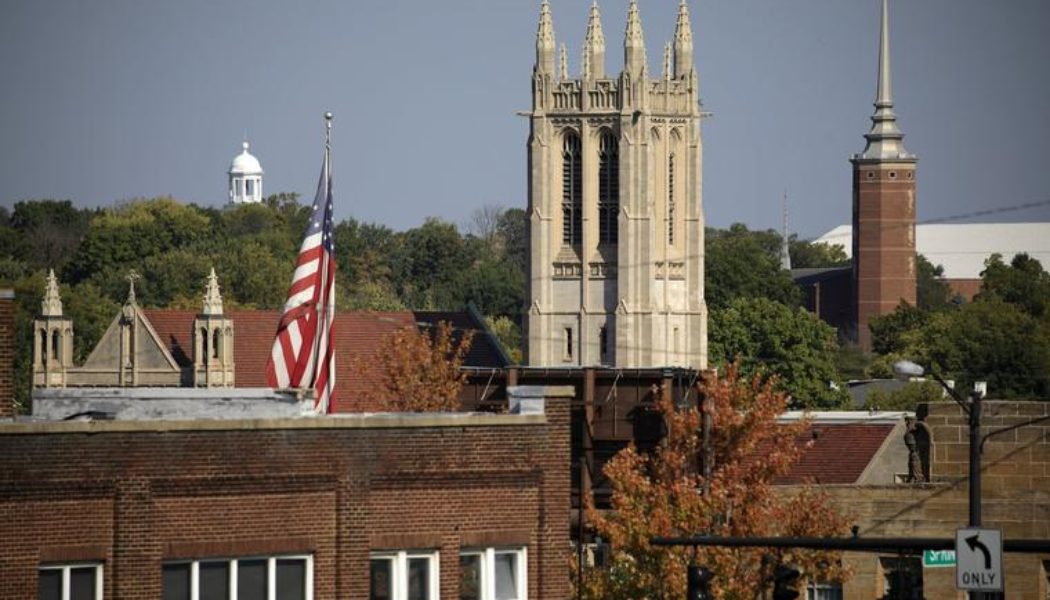
Is Sen. JD Vance telling the truth about Haitian immigrants in Springfield, Ohio, eating pets?
If not, should a Catholic political candidate be corrected for spreading falsehoods? The Catholic bishops of Ohio have done just that, as has the Catholic Republican governor of Ohio, Mike DeWine.
Former president Donald Trump repeated the claim about Haitians killing and eating pets in his debate with Vice President Kamala Harris. Vance, who represents Ohio in the Senate, repeatedly has made the same claim about his state.
The controversy illustrates a different concern about Catholic candidates for political office. For many generations, the usual question has been whether the policies of a particular Catholic candidate cohere with Catholic social teaching. For example, 40 years ago, Catholic vice-presidential nominee Geraldine Ferraro of New York City was corrected by then-Archbishop John O’Connor regarding abortion. The 1984 campaign included an extended debate over Catholics and abortion, with Gov. Mario Cuomo of New York, also Catholic, rejecting O’Connor’s teaching in a landmark address at the University of Notre Dame.
Unlike that, the Springfield controversy is not so much about policy as how public arguments are being made.
Springfield has seen a very large influx of Haitian immigrants in recent years. Local officials and employers stress that the immigrants are legal and needed by local businesses. Citizens also identify problems arising from the influx, including provision of education, housing and medical care, as well as more dangerous traffic. A misreported social-media post about Haitians killing, stringing up and eating cats got wide circulation. Trump made his “eating the pets” claim in the debate. The aftermath led to multiple bomb threats in Springfield, with school closures and deployment of state troopers as a result.
Vance — who spent much of the summer on the defensive regarding his previous comments to Tucker Carlson about how “childless cat ladies” do not have as much of a stake in the future of the country as parents — now found himself in another pet-related furor. Were the Haitians in Springfield eating pets, as he claimed? Were they responsible for a “massive increase” in communicable diseases, as he also claimed?
Local officials — Gov. DeWine, Springfield’s mayor, local police — said that the Trump/Vance claims were false.
Catholics clashed, too, over the Vance claims. Vance is Catholic, having converted to the faith in 2019. Given his prominence as an author and commentator, his conversion was widely noted. Upon his election to the Senate in 2022 and nomination for vice president this summer, Vance was considered by many to be representative of a new generation of Catholic politicians.
Thus the Catholic reaction in Ohio was striking.
On Sept. 19, the Ohio bishops issued a blistering joint letter against those who “perpetuate ill will toward anyone involved based on unfounded gossip.” They clearly meant Trump and Vance, as they defended “the residents of Springfield, Ohio, [who] struggle with violent threats and life disruptions fueled by unfettered social media posts.”
The statement was signed by 10 Ohio Catholic bishops, led by Archbishop Dennis Schnurr of Cincinnati, of which Springfield is part, and including Bishop Daniel Thomas of Toledo and Bishop Earl Fernandes of Columbus.
Specifically addressed to the claims Vance and others have made about Haitians in Springfield, the bishops made their own the admonition of St. James: “Consider how small a fire can set a huge forest ablaze. The tongue is also a fire. … With it we bless the Lord and Father, and with it we curse human beings who are made in the likeness of God” (James 3:5-6, 9).
It is noteworthy that the bishops are not making a public-policy argument. They note that “if we remain true to our principles, we can have a dialogue about immigration without scapegoating groups of people for societal issues beyond their control.”
The objection is not to a policy proposal but to the conduct of the public debate. The bishops object to falsehoods being spread to score political points, with real consequences for the vulnerable. While the bishops do not explicitly say that Vance prompted their joint letter, it is reasonable to think that his prominent Catholic faith was a factor. The message is clear: Spreading “unfounded gossip” to “scapegoat” immigrants is not how Catholics in public life ought to conduct themselves.
Given how reluctant bishops are — especially on a statewide level — to enter into the fray of a presidential election, their collective disgust with the Trump/Vance rhetoric must have been intense.
Another prominent Catholic leader weighed in the day after the bishops’ letter was released. DeWine published an op-ed in The New York Times, entitled “I’m the Republican Governor of Ohio. Here Is the Truth About Springfield.”
“As a supporter of former President Donald Trump and Senator JD Vance, I am saddened by how they and others continue to repeat claims that lack evidence and disparage the legal migrants living in Springfield,” DeWine wrote. “This rhetoric hurts the city and its people, and it hurts those who have spent their lives there.”
Again, it was not a policy disagreement, but an objection to how Trump and Vance were conducting themselves.
Was DeWine’s letter a specifically Catholic response? He wrote as governor and as someone who grew up near Springfield, but three times in the column he refers to his Catholic faith — twice in reference to the parish he and his wife Fran attend and once in relation to a Catholic orphanage he supports in Haiti. The stress on his Catholic faith was likely more to make a point to Vance than it was to impress readers of The New York Times.
“Fran and I have met with so many other dedicated people in Springfield, many of them teachers or volunteers from nonprofits and the faith-based community, who are doing the Lord’s work each day, teaching English to children who speak only Creole or Spanish or helping those who need health care, whether a new Haitian immigrant or someone whose family has been in Springfield for generations,” DeWine wrote.
Note the choice of phrase: “doing the Lord’s work.”
DeWine has been in Ohio politics for more than 40 years, serving both in Washington in the House and Senate and in statewide office as attorney general and governor. The father of eight children, DeWine is a longtime pro-life advocate. In 2022, he was reelected as governor by a whopping 26 percentage points (63% to 37%), while Vance won his Senate seat by six points (53% to 47%).
DeWine’s pointed criticism of his fellow Ohioan was on both political and religious grounds, as both a successful Republican and practicing Catholic. DeWine has bona fides on both fronts that Vance lacks, especially as Vance has recently backed away significantly from his pro-life positions.
Sen. Vance explicitly presents his candidacy as an opportunity to disrupt politics as usual. In Ohio this year, he has certainly done so, the conservative Catholic candidate putting himself offside with both the Catholic bishops and the Catholic governor.







